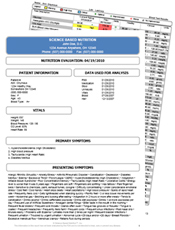What is Beta-Carotene? Beta-carotene is part of the carotenoid family, which contributes to the color or pigmentation of the fruit, oil, grains or vegetable. Generally these types of food are a hue of red, orange or yellow. Beta-carotene is considered fat soluble compound and an antioxidant. As an antioxidant, it protects the body from free radicals. Free radicals over time have the potential to damage cells and can result in chronic illness. Lastly beta-carotene can be converted into vitamin A (1). Vitamin A is considered useful in vision and eye health, immune system, and for healthy skin and mucous membranes (2). Studies are being conducted to show just how viable beta-carotene can be to help with but not limited to sun sensitivity and lung disease.
Some studies have demonstrated the use of high beta-carotene dosages may help people who have a blood disorder called “erythropoietic protoprophyria (EPP) (3). Erythropeoetic protoprophyria is a genetic condition that causes sun sensitivities that are painful along with liver disorders (2). Specifically, the study on, “A Systematic Review of Treatment Options for Dermal Photosensitivity in Erythropoietic Erotoporphyria” by El Minder, X Schneider-Yin, J Steurer and LM Bachmann. The study included dosages of beta carotene for adults 25mg/day to 300 mg/day, with a lower dosage for children. In the end, twenty five studies were included in the final outcome. This study consists of five randomized control trials, the rest were open-label or uncontrolled studies. Overall the patients reported back with 54% strong improvement with erythropoietic protoprophyria symptoms, 28% a mild improvement and 18% no improvement. Studies are currently being formulated to further testing of the efficacy of beta carotene (3). The study shows a participant with EPP has an 82% chance of some improvement in their condition.
Other studies are researching the effects of beta-carotene and lung disease. A test study was conducted on people who have been diagnosed with cystic fibrosis. Cystic fibrosis is considered a long-lasting inflammation of the lungs. The cells that are responsible for causing the inflammation produce a type of oxygen molecule that can harm the proteins/ DNA in the body. By supplementing with antioxidants, the body is able to reduce the damaged caused by the oxygen molecule and restore balance within the lungs. The study published in 2014 about the Effects of Vitamin E and C, beta-carotene, selenium and glutathione on lung disease in people with cystic fibrosis, tested over 426 people. The authors of the study concluded that the treatment was effective while taking antioxidant supplements including beta-carotene. Further test are being conducted with an emphasis on reducing the dependency on antibiotics (4).
How much is the recommended dosage of beta-carotene? Since beta-carotene is fat-soluble carotenoid, it is generally recommended during a meal with at least 3g of fat. This allows for proper absorption in digestive tract. If beta-carotene is taken by the mouth for a high dosage long term, it has the potential to turn the skin yellowish orange (2). Adult’s treatments should include between 10,000 IU to 83,000IU per day as recommended by a medical doctor. Children should always consult a doctor for proper recommendations on dosage. Beta-carotene supplements can come in the following forms: water-based or oil based. Research has suggested that water-based forms may be absorbed more efficiently in the human body. With a proper nutrition plan, many people are able to get their fill of beta-carotene in their daily diets. Since beta-carotene is found in fruits and vegetables, it is recommended to ingest at least 5 servings per day. This would allow the body to absorb at least 3-6 mg of beta-carotene (2). Some of the top recommended beta-carotene sources of nutrient dense foods are the following (5):
• spices (paprika, cayenne, and chili)
• baked sweet potatoes
• kale
• cooked carrots
• romaine lettuce
• parsley
• dried herbs (marjoram, sage, and coriander)
• cooked butternut squash
• garden cress
• cilantro
People who are taking beta-carotene should be mindful of cholesterol lowering medication, mainly those who are taking statins. Statins tend to interact with beta-carotene by reducing the effectiveness of the cholesterol lowering medication. Beta-carotene also can interact negatively with niacin, by reducing its effectiveness of increasing good cholesterol.
Overall, the benefits of beta-carotene are still currently being researched. The initial results are positive and studies show that beta-carotene can be successful in the treatment of sun sensitivity and lung disease. In addition, beta-carotene shows promise in the treatment of eye disorders (age related, macular degeneration) and immune functions as well as other conditions.
By knowing deficiencies and toxicities that make up one’s metabolic analysis, one can evaluate their lifestyle and make better choices to optimize their health. It’s not easy knowing where to start. That is where your experienced nutritionist can help you by analyzing your comprehensive blood analysis and hair tissue mineral test. Ask us today on how you can start on your way towards better health!
References:
«Beta-Carotene, Lung Cancer, Heart Disease – Nutri-Facts.org.» Beta-Carotene, Lung Cancer, Heart Disease – Nutri-Facts.org. N.p., n.d. Web. 28 Apr. 2015.
Enrlich, Steven. «Beta-carotene.» University of Maryland Medical Center. N.p., 27 Dec. 2012. Web. 28 Apr. 2015.
Minder, El, X. SChneider-Yin, J. Steurer, and LM Bachman. «A Systematic Review of Treatment Options for Dermal Photosensitivity in Erythropoietic Protoporphyria.» http://pubmed.com/. N.p., 02 Oct. 2010. Web. 28 Apr. 2015.
«Non‐antibiotic Agents to Assist Antibiotic Treatment for Lung Infection in Cystic Fibrosis.» http://pubmed.com/, May 2013. Web. 28 Apr. 2015.
«Top 10 Foods Highest in Beta Carotene.» HealthAliciousNess. USDA National Nutrient Database for Standard Reference, Release 26., 2015. Web. 28 Apr. 2015.

